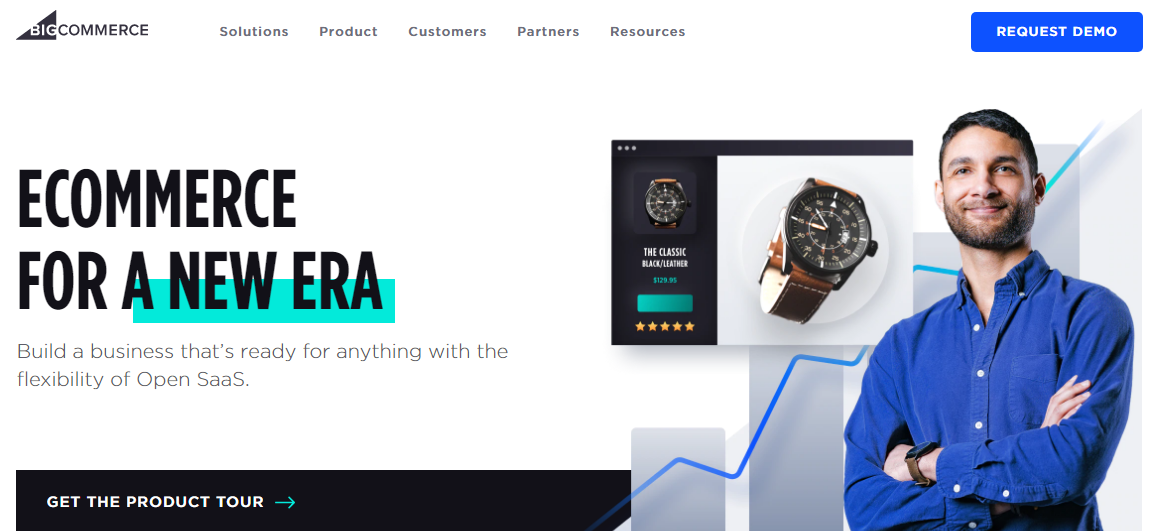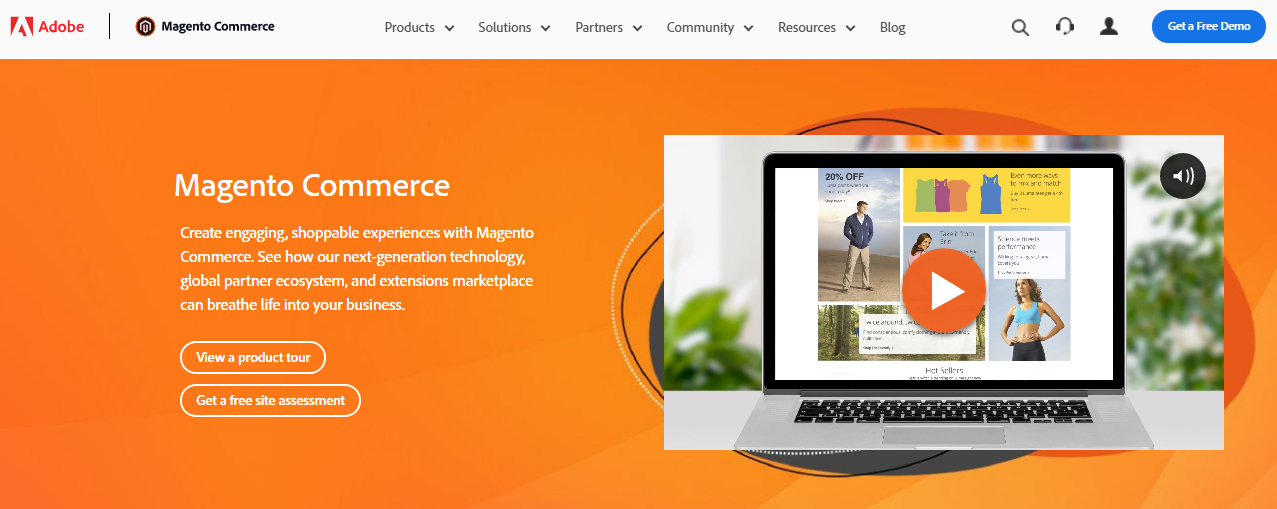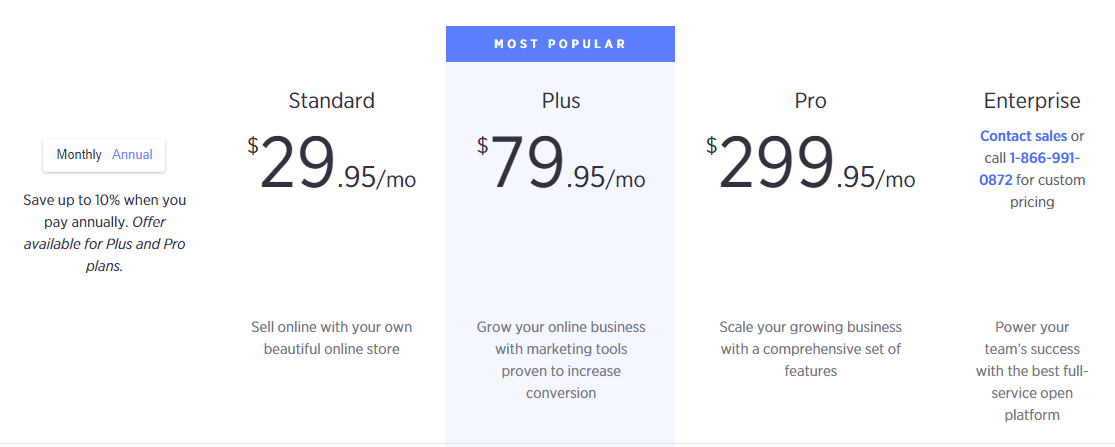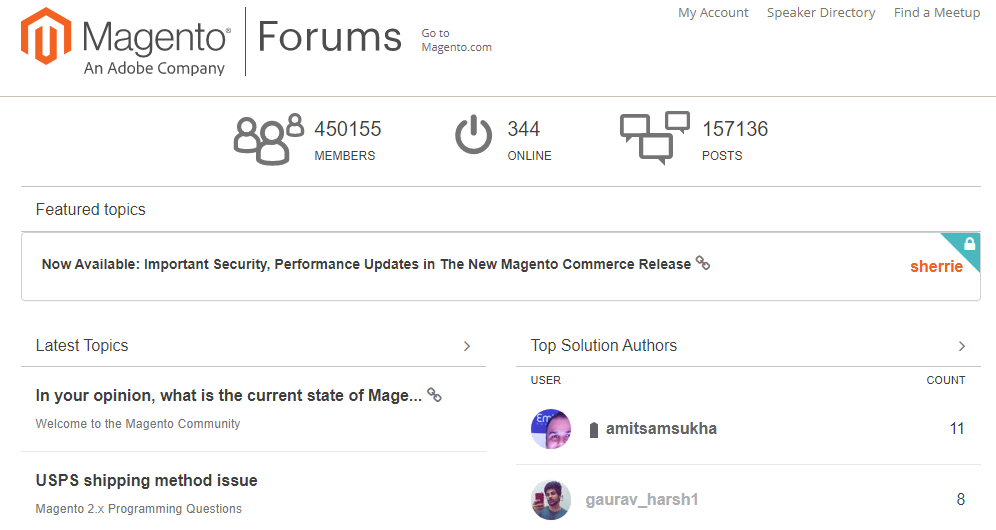- The Main Differences Between BigCommerce vs Magento
- The Similarities
- BigCommerce vs Magento: What is BigCommerce?
- BigCommerce vs Magento: What is Magento?
- The Main Features of BigCommerce
- The Main Features of Magento
- BigCommerce vs Magento – Pricing
- BigCommerce
- Magento
- BigCommerce vs Magento – Support
- BigCommerce
- Magento
- BigCommerce vs Magento - Security
- BigCommerce
- Magento
- BigCommerce vs Magento – Pros and Cons
- BigCommerce
- Magento
- Alternatives
- Salesforce
- Shopify
- Squarespace
- FAQs
- BigCommerce vs Magento - Which One is Best?
Choosing an eCommerce software can be daunting. There are a large variety of online shop creators with different features, pricing, and functionality. Two of the industry-leading platforms are BigCommerce vs Magento.
BigCommerce features a drag-and-drop builder that virtually anyone can use. Take advantage of unlimited staff accounts, products, file storage, and bandwidth. Plus, you will have access to 24/7 customer support and no transaction fees.
While BigCommerce can have you up and running in a matter of minutes, Magento’s open-source framework shouldn’t be overlooked. The flexibility of Magento’s software is worth the extra time and cost. In fact, more than 30% are using Magento, including Ford, Sigma Beauty, and Coca Cola.
Which storefront is best for eCommerce business owners? Let’s take a look at the two platforms.
The Main Differences Between BigCommerce vs Magento
- BigCommerce provides hosting, whereas Magento does not provide hosting.
- BigCommerce is easy to use, whereas Magento has a significant learning curve.
- BigCommerce offers technical support, whereas Magento requires you to hire a developer to make changes.
- BigCommerce is best for small to medium-sized businesses, whereas Magento is for enterprise-size businesses.
- BigCommerce can only connect with existing marketplaces, whereas Magento can create an online marketplace
The Similarities
- Cost of plan is based on annual sales
- Mobile-friendly, responsive design
- Open-source (BigCommerce has an open-source checkout)
- Community support
- Enterprise plans
- Free design templates
- Google Analytics integration
- Custom coupon options
- Edit product URLs
- Multiple currencies
BigCommerce vs Magento: What is BigCommerce?
BigCommerce is an eCommerce store builder that can scale from small businesses to enterprise solutions. It is an industry leader in sales tools, SEO, and integrations. The platform can help take your online business to the next level. Notable brands include Toyota and Ben & Jerry’s.
BigCommerce vs Magento: What is Magento?
Magento is an open-source software and eCommerce solution used by 1 in 4 online businesses. It is completely customizable but does require you to find outside hosting and an experienced Magento developer.
Magento is not for entrepreneurs and small businesses that are still in the “making a business plan” stage. However, if you are looking for enterprise solutions, Magento is your go-to platform.
The Main Features of BigCommerce
eCommerce
- Drag-and-drop page builder
- Unlimited staff accounts
- Free templates
- Unlimited digital or physical products
- Product options (up to 250)
- Product variants (up to 600)
- CMS
- Akamai Image Manager (auto image optimization)
- No transaction fees
- Multiple currencies
- Dropshipping integrations (Ali-Express Dropshipping, Inventory Source, Modalyst, Printful, and Sprocket)
- POS capabilities
Marketing
- Coupons
- Product reviews
- Abandoned cart saver (Plus) – up to 3 automated emails
- Credit card storing (Plus)
- Built-in blog
- Advanced reporting (abandoned cart, customer, finance, marketing, search data)
SEO
- Edit page titles, meta description, and headers
- Edit product URLs and create short URLs
- Responsive templates
- Accelerated Mobile Pages (AMP)
The Main Features of Magento
eCommerce
- Unlimited product filtering to segment any niche of products
- Sell multiple product and services all on the same site
- Custom checkout options like guest checkout and one-page purchases
- Global sales support for multi-language and currencies
Marketing
- Abandoned cart emails to increase overall sales
- Personalize the shopping experience based on big data, including the potential customer’s viewing history
- Unlimited coupon options that can be branded with custom code
- Google Analytics integration
SEO
- eCommerce sitemap
- Edit product URLs and meta information to rank higher on Google
BigCommerce vs Magento – Pricing
BigCommerce
BigCommerce has a free 15-day trial and 4 paid tiers, Standard, Plus, Pro, and Enterprise. The platform offers a 10% discount when paid annually for Plus and Pro plans.
All plans include no transaction fees, unlimited products, file storage and bandwidth, and unlimited staff accounts. Users also receive 24/7 live agent support regardless of tier plan.
Standard
$29.95 per month
- Branded online store
- eBay and Amazon
- Point of sale
- Facebook/Instagram
- Google Shopping (Powered by Sales and Orders)
- Features
- Responsive website
- BigCommerce mobile app
- Single-page checkout
- Apple Pay, Google Pay, Amazon Pay
- Coupons, discounts, and gift cards
- Real-time shipping quotes
- Professional reporting tools
- Blog
- Product ratings and reviews
- Free Sitewide HTTPs and Dedicated SSL
- ShipperHQ shipping rules engine
- Multi-Currency
Plus Plan
$79.95 per month
Standard plan plus:
- Customer groups and segmentation
- Abandoned cart saver
- Persistent Cart
- Stored credit cards
Pro Plan
$299.95 per month
Plus plan plus:
- Custom facets (product filtering)
- Price Lists
- Unlimited API Calls
- Express routing, priority support,
- and customer success management available
- API Support
Seamlessly list, optimize, advertise, sell and fulfill products across 100+ channels. All the capabilities of enterprise ecommerce—without the cost or complexity.
Magento
Magento is open-source software so there is no cost to install. However, you will have significant costs for web hosting, security, domain, themes, transaction fees, and extensions. You are also responsible for using your own web developers to personalize your code or fix any issues that may arise.
Magento Community ($15,000+)
Magento Community is a basic site that offers product variants, Google analytics integration, and email templates that are optimized for all devices.
Magento Commerce ($22,000+)
Magento Commerce is enterprise-level software that uses a drag-and-drop CMS, product category organization, reward points for repeat customers, and customized offers.
The platform costs are based on your annual revenue. Businesses that have an average gross sales revenue of under 1 million dollars will pay $22,000 per year. Companies that gross more than 1 million per year will pay as follows:
- < $1,000,000 – $40,000/year
- $1,000,000 – $5,000,000 – $32,000/year
- $5,000,000 – $10,000,000 – $49,000/year
- $10,000,000 – $25,000,000 – $75,000/year
- $25,000,000+ – $125,000/year
Magento Commerce Cloud ($40,000+)
Magento Commerce Cloud is the premium version of Magento Commerce. It backs up all your data in the cloud, real-time site changes, automatic Magento software updates, and backend support when your site is extra busy (i.e. Black Friday).
- < $1,000,000 – $40,000/year
- $1,000,000 – $5,000,000 – $55,000/year
- $5,000,000 – $10,000,000 – $80,000/year
- $10,000,000 – $25,000,000 – $120,000/year
- $25,000,000+ – $190,000/year
BigCommerce vs Magento – Support
BigCommerce
Customer support with BigCommerce starts with the free trial. All free trial users will receive onboarding information via email.
If you are a paid user, you qualify for the 24/7 live agent support. When you have a question, you will first see options to try and find your answer in the documentation. However, if your answer is not easily found, you will be given contact information to directly contact customer support. This support is available globally both online and by phone.
BigCommerce also offers video tutorials, written documentation, and an active community forum.
Magento
Since Magento is open source, it has a large community of users that are constantly modifying and testing the platform. Due to the active community, extensions to Magento are regularly added. Plus, if you have a question, chances are the community can help you faster than a customer service rep.
Magento also provides developer documentation, tech resources, and a list of solution partners that can help you personalize the platform for your business’s needs.
BigCommerce vs Magento – Security
BigCommerce
BigCommerce features standard security measures regarding information transferred and stored on the platform. Security encompasses the following:
- BigCommerce provides a secure environment for customer data stored and processed through the platform’s checkout (ISO/IEC 27001:2013 & PCI DSS 3.2)
- Level 1 certified
- Firewalls
- File integrity scanners
- Intrusion detection
Magento
Magento users are responsible for their own server environment. Magento recommends the following security measures:
- HTTPS (SSL certificate) for all website pages and at minimum checkout and account pages.
- Content Delivery Network (CDN) & DDoS Protection to prevent website attacks
- Web Application Firewall (WAF)
- Virtual Private Cloud – only secure connections to the cloud are permitted
- Penetration testing – Magento tests its core software regularly for bugs and security breaches. Any customizations or extensions should be tested by the user.
- Payment Gateway – Customer payments are not stored within Magento
- Sensitive data is encrypted
- Read-Only File System
- Provisioning process for executable code. Any custom code requires pushing the source code from your source repository into a remote repository that starts the deployment process.
- All source code changes are logged into a Git repository.
- Backups are completed every hour using Magento’s backup service. All backups are encrypted.
BigCommerce vs Magento – Pros and Cons
BigCommerce
Pros
- Free trial
- Compared to competitors, BigCommerce offers more features for less money
- Drag-and-drop builder
- No transaction fees
- Multiple-currency support
- Custom fields
- Robust reporting tools
- Product reviews
- Real-time shipping quotes (integrations)
- Multiple SEO features
- Abandoned cart
- Unlimited staff accounts (all plans)
- Unlimited file storage (all plans)
- Unlimited products (all plans)
- Unlimited bandwidth (all plans)
- 24/7 live agent support (all plans)
- GDPR compliant
- Built-in blog
Cons
- Annual online sales limits (must upgrade if sales increase)
- Free themes lack variety
- Free themes lack font selection
- Page builder lacks a smooth user experience
- No RSS feeds for built-in blog
Magento
Pros
- Core features that competitors require integrations for (SEO management, marketing, order management, CMS)
- Open-source, completely customizable
- Magento can be self-hosted
- Change pricing based on the segment of customers (i.e. VIP, employee, etc.)
- Can scale to annual revenues in the millions
- Community support of developers
- Responsive
- Functional Testing Framework (FTF)
Cons
- Developers are hard to find and expensive
- Difficult to migrate to Magento
- Cannot use a traditional hosting platform (must be experienced in Magento)
- Slow loading time for edits
- Steep learning curve
Alternatives
Salesforce
Salesforce is a customer relationship management (CRM) software. Additional apps include marketing, customer service, analytics, and more. Salesforce B2C Commerce is an add-on that reduces abandoned carts, is optimized for mobile, utilizes social channels, and more.
Pros
- Add or remove integrations to customize the platform
- Widely used software that offers a wide network of professional users
- Robust CRM platform
- Salesforce B2C Commerce
Cons
- Add-ons are extra cost
- Expensive monthly fee
- Extensive onboarding
- The dashboard could be simplified
- Customer support is lacking
Pricing
- 30-day free trial
- Starts at $25 per month per user
Shopify
Shopify is a web-based eCommerce platform. Products can be purchased from your online store, a “buy button”, or even in person through Point of Sale (POS) systems. Shopify is great for global businesses, drop shippers or business owners that sell online as well as in brick and mortar stores.
Pros
- Sell on Shopify hosted site, social media, or your website
- Industry-leading mobile app
- Tax rates for the US, Canada, EU
- Abandoned cart recovery
- In-house email marketing tools
- 24/7 customer service
Cons
- Transaction fees
- No multi-lingual support
- Reporting and real-time shipping rates only available on higher-tier plans
- Limited staff accounts
- Limited options per product
- Integrations can get costly
Pricing
- Shopify has a free 14-day trial.
- Pricing starts at $9 per month.
Squarespace
Squarespace allows you to add and remove sections of your template without completely starting over (a requirement with competitor Wix). For an extra cost, you can add integrated email marketing.
Pros
- Over 100 optimized themes
- Live chat with screencast capability
- Mobile app
- Blog
- Podcast capability
Cons
- No autosave when building site
- Repetitive tasks could be made simpler
- Not built for websites with sub-tab navigation
- Slow page speeds
Pricing
- Squarespace offers a free 14-day trial.
- Pricing starts at $12 per month for personal sites, $18 for an eCommerce store.
FAQs
Question: What is the difference between Shopify and BigCommerce?
Question: Why Magento is best for ecommerce?
Question: Which is better WooCommerce or Magento?
Question: Is BigCommerce open source?
Question: What is the best Webshop platform?
Question: What is the difference between Magento 1 and Magento 2?
BigCommerce vs Magento – Which One is Best?
When selecting an eCommerce solution, it’s important to consider the size of your company, how quickly it may scale, unique platform features, and your monthly budget. For example, if your company is just starting out and you need to get off the ground running, Magento may postpone the start date whereas BigCommerce can be selling products the same day you sign up.
However, since Magento is well-respected within the eCommerce community, you shouldn’t toss it aside. While it will take more work to get started, in the long run, it can save you significant monthly maintenance costs compared to BigCommerce. Especially if you have an eCommerce business in a highly competitive niche, investing in the Magento platform could help you stand out in a sea of noticeable free templates offered by BigCommerce.
BigCommerce is best for small and medium-sized businesses. The monthly cost is affordable and the platform has enough features to stay out from the crowd and support your growing business.
If you need an eCommerce platform that can support enterprise features and complete customization, Magento’s open-source software has limitless possibilities.
Further read:











